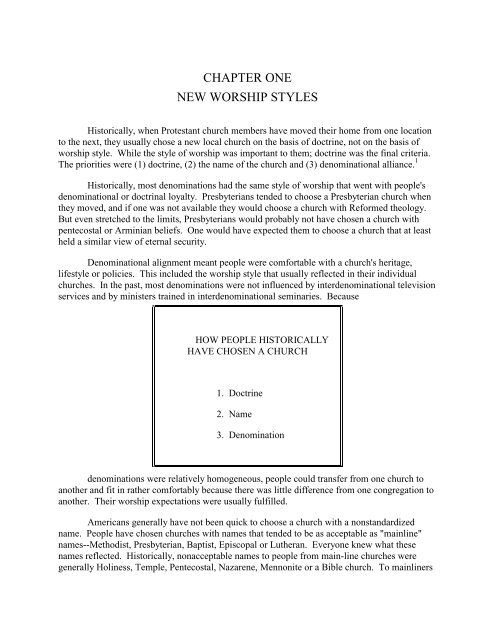PUTTING AN END TO WORSHIP WARS - Elmer Towns
PUTTING AN END TO WORSHIP WARS - Elmer Towns
PUTTING AN END TO WORSHIP WARS - Elmer Towns
- TAGS
- worship
- elmer
- towns
- elmertowns.com
You also want an ePaper? Increase the reach of your titles
YUMPU automatically turns print PDFs into web optimized ePapers that Google loves.
CHAPTER ONE<br />
NEW <strong>WORSHIP</strong> STYLES<br />
Historically, when Protestant church members have moved their home from one location<br />
to the next, they usually chose a new local church on the basis of doctrine, not on the basis of<br />
worship style. While the style of worship was important to them; doctrine was the final criteria.<br />
The priorities were (1) doctrine, (2) the name of the church and (3) denominational alliance. 1<br />
Historically, most denominations had the same style of worship that went with people's<br />
denominational or doctrinal loyalty. Presbyterians tended to choose a Presbyterian church when<br />
they moved, and if one was not available they would choose a church with Reformed theology.<br />
But even stretched to the limits, Presbyterians would probably not have chosen a church with<br />
pentecostal or Arminian beliefs. One would have expected them to choose a church that at least<br />
held a similar view of eternal security.<br />
Denominational alignment meant people were comfortable with a church's heritage,<br />
lifestyle or policies. This included the worship style that usually reflected in their individual<br />
churches. In the past, most denominations were not influenced by interdenominational television<br />
services and by ministers trained in interdenominational seminaries. Because<br />
HOW PEOPLE HIS<strong>TO</strong>RICALLY<br />
HAVE CHOSEN A CHURCH<br />
1. Doctrine<br />
2. Name<br />
3. Denomination<br />
denominations were relatively homogeneous, people could transfer from one church to<br />
another and fit in rather comfortably because there was little difference from one congregation to<br />
another. Their worship expectations were usually fulfilled.<br />
Americans generally have not been quick to choose a church with a nonstandardized<br />
name. People have chosen churches with names that tended to be as acceptable as "mainline"<br />
names--Methodist, Presbyterian, Baptist, Episcopal or Lutheran. Everyone knew what these<br />
names reflected. Historically, nonacceptable names to people from main-line churches were<br />
generally Holiness, Temple, Pentecostal, Nazarene, Mennonite or a Bible church. To mainliners
















